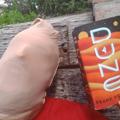This was a rather neat read about the potential of dreams. What if your dreams had the power to change reality? It sounds good in theory, but in practice it can easily lead to chaos—something the main character, George Orr, uniquely understands. Forced to attend therapy for what people assume to be some sort of mental affliction convincing Orr that his dreams become real, he is thrown in with Dr. Haber, a psychiatrist assigned to Orr to try and help him overcome his problems. In so doing, however, Haber figures out that Orr isn’t crazy, and starts manipulating him and his dreams for his own purposes.
For a short book, this one sure covers a lot of ground. Lots of philosophical thoughts about the rights of man to interfere in destiny, the corrupting influence of power, and general thoughts on the importance of human connection in one’s life are all present in this book. Whether or not you subscribe to the idea of some sort of cosmic balance, it’s telling that (thematic spoilers here) every time Haber tries to make Orr dream something good for humanity, Orr dreams up a monkey’s paw version of the wish.
It's an older book so some parts definitely feel their age, but overall I really enjoyed thinking about the implications of having a power like Orr’s. I was left with some nagging questions in the end (major ending spoilers here) (did Orr create the Aliens or just ship them in from another reality? How did Haber, and to a lesser extent Heather, resist Orr’s reality changes so completely?), but I think it’s left open on purpose to allow you the space to come to your own conclusions.
This was a fun read, and I’ll likely seek out more from this author in the future.












